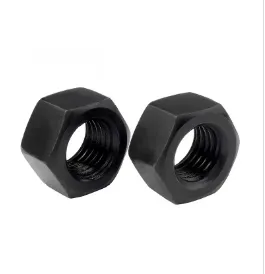Impact of Materials on DIN934 Hex Nuts: Making Informed Choices
Nov . 22, 2024 09:12 Back to list
Impact of Materials on DIN934 Hex Nuts: Making Informed Choices
DIN934 hex nuts are among the most commonly used fasteners across multiple industries, valued for their versatility and strength. When selecting hex nuts for specific applications, one crucial factor to consider is the material composition, as different materials like stainless steel, carbon steel, and alloy steel impact the nut's performance, durability, and suitability for various conditions. By understanding how these materials affect the performance of DIN934 hex nuts, users can make well-informed decisions that align with their project's demands.

Stainless Steel Hex Nuts: Corrosion Resistance and Versatility
Stainless steel hex nuts are a popular choice, especially in environments exposed to moisture or corrosive agents. Stainless steel, known for its high resistance to rust and corrosion, makes these hex nuts particularly valuable in marine, construction, and chemical industries. When opting for stainless steel DIN934 hex nuts, users benefit from a material that remains durable even under extreme weather conditions or in environments with high humidity.
These hex nuts are typically made from grade 304 or 316 stainless steel. Grade 304 offers good corrosion resistance, while grade 316, with its higher molybdenum content, provides even greater resistance, making it ideal for more demanding applications like marine structures. However, stainless steel hex nuts generally have a lower tensile strength compared to carbon steel or alloy options, so users should consider the specific load and stress requirements when selecting stainless steel for their projects.
Carbon Steel Hex Nuts: Strength and Affordability
Carbon steel hex nuts are another popular choice due to their high tensile strength and cost-effectiveness. Carbon steel, which is primarily composed of iron and carbon, provides excellent strength, making these hex nuts ideal for heavy-duty applications in construction, automotive, and industrial machinery. DIN934 carbon steel hex nuts can withstand substantial loads, offering durability at an affordable price, which makes them a go-to option for budget-conscious projects.
However, one of the trade-offs with carbon steel hex nuts is their lower corrosion resistance compared to stainless steel. To enhance their durability, many carbon steel hex nuts undergo additional coatings, such as zinc plating or black oxide finishes, which improve their resistance to rust and corrosion. While carbon steel hex nuts perform exceptionally well in high-stress environments, they may require extra protective measures for outdoor or high-moisture applications.
Alloy Steel Hex Nuts: High Strength and Enhanced Durability
For applications that demand exceptional strength and resilience, alloy steel hex nuts are an excellent option. Alloy steel is carbon steel that’s enhanced with other elements like chromium, nickel, and molybdenum, which improve the material's hardness, toughness, and overall performance. DIN934 hex nuts made from alloy steel can withstand extreme loads and are frequently used in heavy equipment, aerospace, and high-temperature applications.
The alloy composition of these hex nuts provides increased resistance to wear and fatigue, making them suitable for applications where both stability and longevity are critical. However, like carbon steel hex nuts, alloy steel nuts are susceptible to rust and corrosion if not treated. They are often coated or plated to mitigate this, which further enhances their performance and lifespan in harsh environments.
Comparing the Performance of Stainless Steel, Carbon Steel, and Alloy Steel Hex Nuts
When deciding between stainless steel, carbon steel, and alloy steel hex nuts, it’s essential to consider the unique benefits and limitations each material presents. Stainless steel hex nuts excel in corrosion resistance, making them ideal for outdoor or moisture-exposed applications. However, for applications requiring extreme load-bearing capacity, carbon steel hex nuts offer a stronger and more cost-effective solution. Alloy steel hex nuts are unmatched in strength and wear resistance, making them suitable for high-stress and high-temperature environments.
To summarize:
- Stainless steel hex nuts: Ideal for corrosion-prone environments; best for marine, chemical, and outdoor applications.
- Carbon steel hex nuts: High tensile strength; cost-effective for construction and heavy machinery, but may need extra corrosion protection.
- Alloy steel hex nuts: Superior strength and durability; recommended for extreme load-bearing and high-temperature applications.
Making the Right Choice: Selecting the Best Material for DIN934 Hex Nuts
Choosing the right DIN934 hex nuts involves analyzing the environmental conditions, load requirements, and budget constraints of the project. Stainless steel offers long-lasting corrosion resistance, suitable for exposed and moist environments, while carbon steel provides affordable strength for applications requiring high durability but without extreme corrosion risks. Alloy steel, with its high strength and durability, is ideal for high-stress applications, especially when supplemented with protective coatings.
By understanding the strengths and limitations of each material, users can select the best hex nuts for their projects, optimizing both performance and longevity. Explore our comprehensive range of DIN934 hex nuts in various materials to ensure your project benefits from the ideal combination of durability, cost-effectiveness, and resilience.
Latest news
-
The Role of Tempering In B7 Stud Bolts
NewsJun.24,2025
-
Salt Spray Resistance of Black Oxidation Hex Bolts
NewsJun.24,2025
-
Heat Treatment for High Strength Hex Bolts
NewsJun.24,2025
-
GB Hex Bolts Manufacturing Quality Control
NewsJun.24,2025
-
Corrosion Resistance of Uncoated Carbon Steel Hex Bolts
NewsJun.24,2025
-
Common Uses of Plain Hex Bolts in Construction
NewsJun.24,2025
